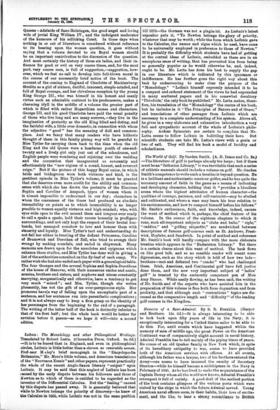Leibniz : The Monadology and other Philosophical Writings. Translated by
Robert Latta. (Clarendon Press, Oxford. 8s. ed.) —It is to be feared that in England, and even in philosophical circles, Leibniz is little better than a clarum ac venerabite nemen. Prof.asor 31 ley's brief monograph in the "Encyclopedia Britannica," Mr. Merz's little volume, and American translations of the "Nouveaux Easels" and other papers, represent practically the whole of the recent Anglo-Saxon literary " output " upon Leibniz. It may be said that this neglect of Leibniz has been caused by the early dispute between his followers and those of lievrton as to which of them is entitled to be regarded as the inventor of the Differential Calculus. But the " feeling " caused by this dispute has passed away. It is generally believed that while to Newton belongs the priority of discovery—he knew of the Calculus in 160, while Leibniz was not in the same position till 1676—the German was not a plagiatist. As Liebniz's latest expositor puts it, "To Newton belongs the glory of priority, whatever that may be worth ; while the form which Leibniz gave to the Calculus, the names and signs which he used, have come to be universally employed in preference to those of Newton." It is probably the difficulty which students have had of getting at the central ideas of Leibniz, embedded as these are in an amorphous mass of writing, that has prevented him from being so generally popular as he would otherwise be, and, indeed, ought to be. Mr. Latta has done his best to supply the gap in our literature which is indicated by this ignorance or indifference. He has further gone the right way about this task by endeavouring to make clear the purpose of the "Monadology." "Leibniz himself expressly intended it to be a compact and ordered statement of the views he had expounded in many scattered papers and in his somewhat desultory Theodic6e,' the only book he published." Mr. Latta makes, there- fore, his translation of the "Monadology" the centre of his book, but he includes in it " The Principles of Nature and of Grace," and translations of other passages from Leibniz which are necessary to a complete understanding of his system. Above all, he gives in a very elaborate and exhaustive introduction a very full and sympathetic account of the whole of Leibniz's philo- sophy. Ardent Spinozists are certain to complain that Mr. Latta seems to follow Leibniz in belittling their hero. But scientific students can take Mr. Latta's views with a grain or two of salt. They will find his book a model of lucidity and scholarliness.


















































 Previous page
Previous page